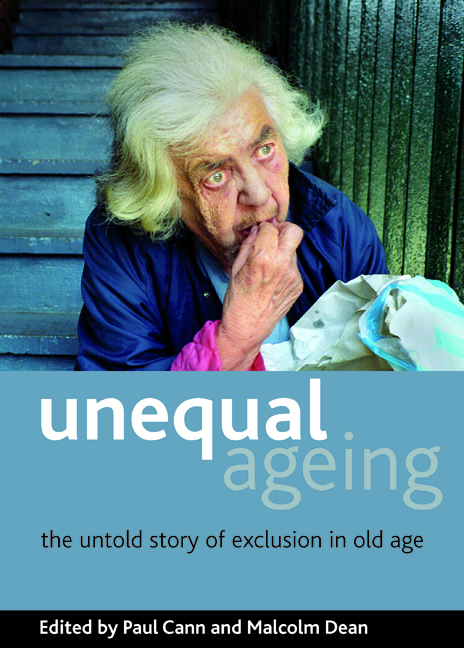Book contents
- Frontmatter
- Contents
- List of tables and figures
- Notes on contributors
- Acknowledgements
- one How social age trumped social class?
- two Too tight to mention: unequal income in older age
- three three The uneven dividend: health and well-being in later life
- four No place like home? Housing inequality in later life
- five What does it mean to be old?
- six A life worth living? Quality of life in older age
- seven Why is ageing so unequal?
- eight Rewriting the story
- Index
three - three The uneven dividend: health and well-being in later life
Published online by Cambridge University Press: 16 July 2022
- Frontmatter
- Contents
- List of tables and figures
- Notes on contributors
- Acknowledgements
- one How social age trumped social class?
- two Too tight to mention: unequal income in older age
- three three The uneven dividend: health and well-being in later life
- four No place like home? Housing inequality in later life
- five What does it mean to be old?
- six A life worth living? Quality of life in older age
- seven Why is ageing so unequal?
- eight Rewriting the story
- Index
Summary
• Almost 98 per cent of people with dementia in the UK are over 65; its prevalence doubles with every five-year increase across the age range, but only one-third of those with dementia receive a formal diagnosis.
• The poorest older people are:
– over five times more likely than the richest to have poor general health
– about five times more likely to have difficulty walking
– twice as likely to have diabetes
– more than twice as likely as people under 50 to die.
The asset of health
Health is a precious resource. It is a basic need, shared by all human beings in every country of the world. Our state of health strongly influences our ability to enjoy life, to participate in society and to fulfil our potential, as well as the way we feel about ourselves and – often – how others feel about us.
In later life, more than at any other time except perhaps in the few months after we are born, health is a critical factor that defines us, enables us and constrains us. It determines what growing old means to us. How old we feel and act can depend to a large extent on our mental and physical health.
Defining health
What is health, exactly? It has been defined as ‘a state of complete physical, mental and social well-being, and not merely the absence of disease or infirmity’, and as a ‘fundamental human right’.
The state of our health is measured most often in terms of how long we live and whether we suffer from one or more mental or physical illnesses. Physical, mental and social well-being are closely related and can be mutually reinforcing. So, for example, if we have a positive attitude to life and feel good about ourselves, we are more likely to have enjoyable relationships with other people that are health-enhancing, and less likely to suffer from physical disease. Conversely, being physically unwell can isolate us from others and make us feel anxious and depressed, possibly triggering further illness.
Unequal health
Although everyone needs health, not everyone enjoys it in the same measure. Indeed, there are gross inequalities in the way health is distributed across the human population, both between countries and within countries, and between different groups and neighbourhoods. This chapter is about inequalities in health.
- Type
- Chapter
- Information
- Unequal AgeingThe Untold Story of Exclusion in Old Age, pp. 53 - 76Publisher: Bristol University PressPrint publication year: 2009
- 1
- Cited by

